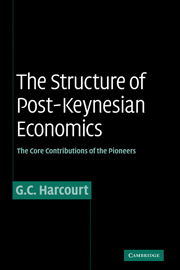Book contents
- Frontmatter
- Contents
- List of figures
- Preface and acknowledgements
- 1 Introduction: why post-Keynesian economics and who were its Cambridge pioneers?
- 2 Post-Keynesian macroeconomic theories of distribution
- 3 Post-Keynesian theories of the determination of the mark-up
- 4 Macroeconomic theories of accumulation
- 5 Money and finance: exogenous or endogenous?
- 6 The complete model: its role in an explanation of post-war inflationary episodes
- 7 Theories of growth: from Adam Smith to ‘modern’ endogenous growth theory
- 8 Applications to policy
- Appendix 1 Biographical sketches of the pioneers: Keynes, Kalecki, Sraffa, Joan Robinson, Kahn, Kaldor
- Appendix 2 The conceptual core of the post-Keynesian discontent with orthodox theories of value, distribution and growth
- Bibliography
- Index
4 - Macroeconomic theories of accumulation
Published online by Cambridge University Press: 22 September 2009
- Frontmatter
- Contents
- List of figures
- Preface and acknowledgements
- 1 Introduction: why post-Keynesian economics and who were its Cambridge pioneers?
- 2 Post-Keynesian macroeconomic theories of distribution
- 3 Post-Keynesian theories of the determination of the mark-up
- 4 Macroeconomic theories of accumulation
- 5 Money and finance: exogenous or endogenous?
- 6 The complete model: its role in an explanation of post-war inflationary episodes
- 7 Theories of growth: from Adam Smith to ‘modern’ endogenous growth theory
- 8 Applications to policy
- Appendix 1 Biographical sketches of the pioneers: Keynes, Kalecki, Sraffa, Joan Robinson, Kahn, Kaldor
- Appendix 2 The conceptual core of the post-Keynesian discontent with orthodox theories of value, distribution and growth
- Bibliography
- Index
Summary
Keynes' theory: right ingredients, wrong recipe
Keynes himself was never comfortable with the analysis and the presentation of his theory of investment in chapter 11 of The General Theory, ‘The marginal efficiency of capital’. He much preferred the freedom from formal constraints to be found in his exposition in the exhilarating chapter 12, ‘The state of long-term expectation’. It contains some of his finest and most memorable passages – for example, on the nature and operation of the stock exchange and the consequences for the behaviour of the economy when enterprise and speculation change places:
If I may be allowed to appropriate the term speculation for the activity of forecasting the psychology of the market, and the term enterprise for the activity of forecasting the prospective yield of assets over their whole life, it is by no means always the case that speculation predominates over enterprise … Speculators may do no harm as bubbles on a steady stream of enterprise. But the position is serious when enterprise becomes the bubble on a whirlpool of speculation. When the capital development of the country becomes the by-product of the activities of a casino, the job is likely to be ill-done. The measure of success attained by Wall Street, regarded as the institution of which the proper social purpose is to direct new investment into the most profitable channels in terms of future yield, cannot be claimed as one of the outstanding triumphs of laissez-faire capitalism.
Keynes (1936; CW, vol. VII, 1973, 158–9, emphasis in original)- Type
- Chapter
- Information
- The Structure of Post-Keynesian EconomicsThe Core Contributions of the Pioneers, pp. 55 - 65Publisher: Cambridge University PressPrint publication year: 2006



